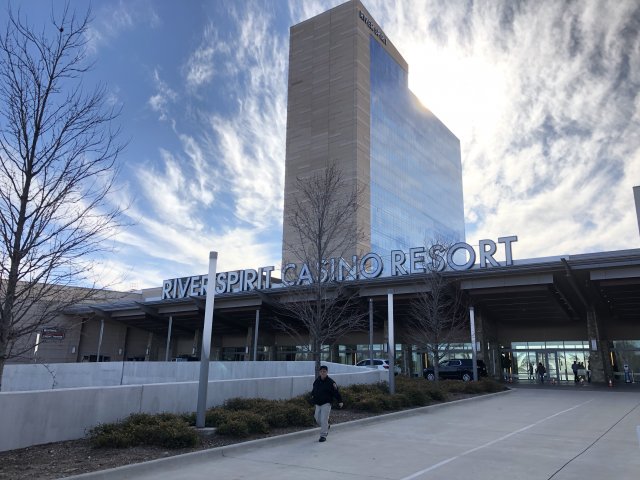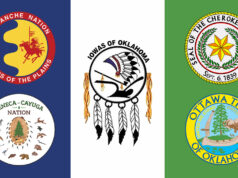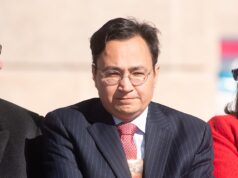

Hours before 2019 turns into 2020, the Cherokee, Chickasaw and Choctaw nations filed a federal lawsuit against Oklahoma Gov. Kevin Stitt today, asking a judge to declare that the Model Tribal Gaming Compact renews automatically on Jan. 1.
“Gov. Stitt has made comments about ‘uncertainty that exists’ regarding Class III gaming after Jan. 1, threats to our casino vendors and their livelihoods and demands for redundant audits,” Cherokee Nation Principal Chief Chuck Hoskin Jr. said in a press release. “We have little choice but to ask a federal judge to confirm the compact’s automatic renewal on Jan. 1.”
Hoskin was one of more than 50 tribal leaders who appeared at a Dec. 19 press conference at the River Spirit Casino and Resort in Tulsa to reject Stitt’s offer of a temporary gaming compact extension. Stitt formally requested renegotiation of the compact this summer and has argued that his action prevents automatic renewal. Tribal leaders, on the other hand, say action taken by the Oklahoma Horse Racing Commission triggered automatic renewal regardless of Stitt’s request to renegotiate.
The language in dispute appears as Part 15 B of the compact, which reads:
This Compact shall have a term which will expire on January 1, 2020, and at that time, if organization licensees or others are authorized to conduct electronic gaming in any form other than pari-mutuel wagering on live horse racing pursuant to any governmental action of the state or court order following the effective date of this Compact, the Compact shall automatically renew for successive additional fifteen-year terms; provided that, within one hundred eighty (180) days of the expiration of this Compact or any renewal thereof, either the tribe or the state, acting through its Governor, may request to renegotiate the terms of subsections A and E of Part 11 of this Compact.
Stitt contends that Class III gaming — which includes table games and traditional slot machines — will become illegal at the stroke of midnight without a new compact in place. Tribes have maintained that business will continue as usual within their casinos.
“The Tribes remain firmly united on the automatic renewal of the compacts. We have communicated our position to Gov. Stitt on numerous occasions in hopes of finding a practical path forward benefitting both the state and tribes,” said Matthew Morgan, Oklahoma Indian Gaming Association chairman and head of gaming for the Chickasaw Nation, in a press release. “That said, as leaders of sovereign nations, the Tribal leaders must honor the compacts and will continue to do so on Jan. 1, 2020, as they’ve done the past 15 years. Tribal leaders have the right as well as the responsibility to protect their citizens. Tribal leaders applaud the action taken today by the Cherokee, Choctaw and Chickasaw nations to seek certainty on the matter of automatic renew through the federal court.”
Stitt ‘disappointed’ that tribes chose lawsuit over arbitration
Just after 3 p.m. Tuesday, Stitt’s team responded to the three tribes’ lawsuit and announced that two other tribes had signed the governor’s proposed eight-month compact extension.
“I am disappointed that a number of Oklahoma tribes, led by the Chickasaw, Cherokee and Choctaw nations, did not accept the state’s offer on Oct. 28 for a three-person arbitration panel to resolve our dispute outside of court,” Stitt said in a press release. “This was a capstone action to their numerous refusals to meet with the state and begin negotiations on the Model Gaming Compact to ensure a win-win for all parties by the end of this year. I was elected to represent all 4 million Oklahomans, and I will continue to be laser-focused on an outcome that achieves a fair deal and is in the best interest of the state and its citizens.”
In the same release, Stitt announced that the Kialegee Tribal Town and the United Keetoowah Band of Cherokee Indians both signed the eight-month gaming compact extension he has pitched to all compacted tribes in the state.
“I appreciate the honesty and boldness of the Kialegee Tribal Town and the United Keetoowah Band of Cherokee Indians who recognize the Jan. 1, 2020 expiration in the Model Gaming Compact and have signed on to the eight-month extension generously offered by the state,” Stitt said. “These extensions will enable the parties to negotiate a compact that better accounts for the differing needs of tribes throughout the state and the state’s interests in preserving the substantial exclusivity without a cloud of legal uncertainty. The state of Oklahoma offered an extension, with no strings attached, to all tribes that operate casinos in the state, and my door continues to be open for more tribes to join who are worried about impending uncertainty.”
Donelle Harder, a senior policy advisor to Stitt, confirmed that neither the Kialegee Tribal Town nor the United Keetoowah Band of Cherokee Indians currently operates a casino in Oklahoma. The Kialegee proposed a casino in Broken Arrow in 2011, but a series of legal fights with federal agencies and the Muscogee (Creek) Nation stalled that effort.
“Both are on the gaming compact. Today, neither of them have one open, but Keetoowah is in the process of opening one. They had a conflict earlier this year with the Cherokee Nation that got resolved. Then the Keetoowah were able to get land and trust for their casino, so they have been in the process for pursuing their own casino,” Harder told NonDoc. “They signed an extension because they are on the gaming compact, and so if at any point in these eight months they are looking to re-open or open their new operation, they will be protected.”
Asked whether the Stitt administration will be taking action to enforce its position that Class III gaming will be unauthorized in Oklahoma come Jan. 1, Harder said not at this time.
“To be honest with you, we were not expecting three of the tribes to file in court today,” she said. “So we are going to shift our focus toward that lawsuit. I don’t believe you will see us take any enforcement action while we do that.”
Asked if the Alcoholic Beverage Laws Enforcement (ABLE) Commission might get involved, Harder said she did not think so.
“That’s not something we’ve discussed at this time,” Harder said. “We truly are going to focus on getting more tribes engaged with the eight-month extension.”
Executives send letter to executive
Earlier Tuesday, Hoskin, Chickasaw Gov. Bill Anoatubby and Choctaw Chief Gary Batton also released a Dec. 31 letter to Stitt, in which they say their lawsuit’s purpose is to “restore certainty” to their gaming activities.
In full, their letter reads:
For some time, we have tried to establish meaningful intergovernmental engagement regarding our gaming compacts, but you have continued to reject our compacts’ plain terms. Recently, you have gone further, stating allegations against us and threats to our operations. We have a solemn duty to protect our Nations’ legal and sovereign rights, as well as our citizens’ interests. Accordingly, today we filed suit to ask the court to interpret our compacts’ “shall automatically renew” clause and to hold our compacts renew, effective January 1, 2020. We filed this action to restore certainty and to ensure the stability of lawful activities that are critical both to our tribal governments’ fiscal foundations and to the broader Oklahoma economy.
The dispute — like the lawsuit — is about renewal, not rates. Our compacts expressly provide both for renewal and for rate renegotiations. We have never refused to discuss rates but insisted only that any negotiations conform with our compacts’ plain provisions and Federal law. Unfortunately, your ongoing dismissal of this threshold framework has made progress impossible, and your words and threatened actions leave us no reasonable alternative but to file suit. Through this suit, we will continue to seek a resolution that honors the terms of our continuing agreement, the will of the Oklahoma citizens who approved the State’s compact offer to us, and the Federal law that controls our intergovernmental compacts and relations.
Once we have resolved this dispute, we are hopeful we will again work together for the benefit of all Oklahomans. Until then, we will keep our word and abide our renewing compacts.
Lawsuit, gaming compact dispute background
The lawsuit announced against Stitt on Tuesday was filed in U.S. District Court for the Western District of Oklahoma, and Stitt’s legal team has 21 days to file a response or request an extension. Former federal judge and Oklahoma City University President Robert Henry is listed as the tribes’ lead counsel in the suit. Stitt has hired the law firm Dykema Gossett to assist the state with the gaming dispute, and on Jan. 3 he announced the retainment of the international law firm Perkins Coie as well.
Earlier Tuesday, Stitt’s administration announced one-year extensions with the Cherokee and Choctaw nations on hunting and fishing compacts that provide revenue to the state in exchange for bulk licenses for tribal members.
Monday, Chickasaw Nation leaders told Stitt they would not be complying with his request for casino audits, but they would let his team examine financial records.
Read the tribes’ official complaint against Gov. Kevin Stitt
 Loading...
Loading...
(Update: This story was updated at 2:25 p.m. to include the filed version of the lawsuit and additional information. It was updated again at 4:40 p.m. to include comment from Stitt and additional information. It was updated a final time on Friday, Jan. 3, 2020, to include Stitt’s hiring of the law firm Perkins Coie.)




















